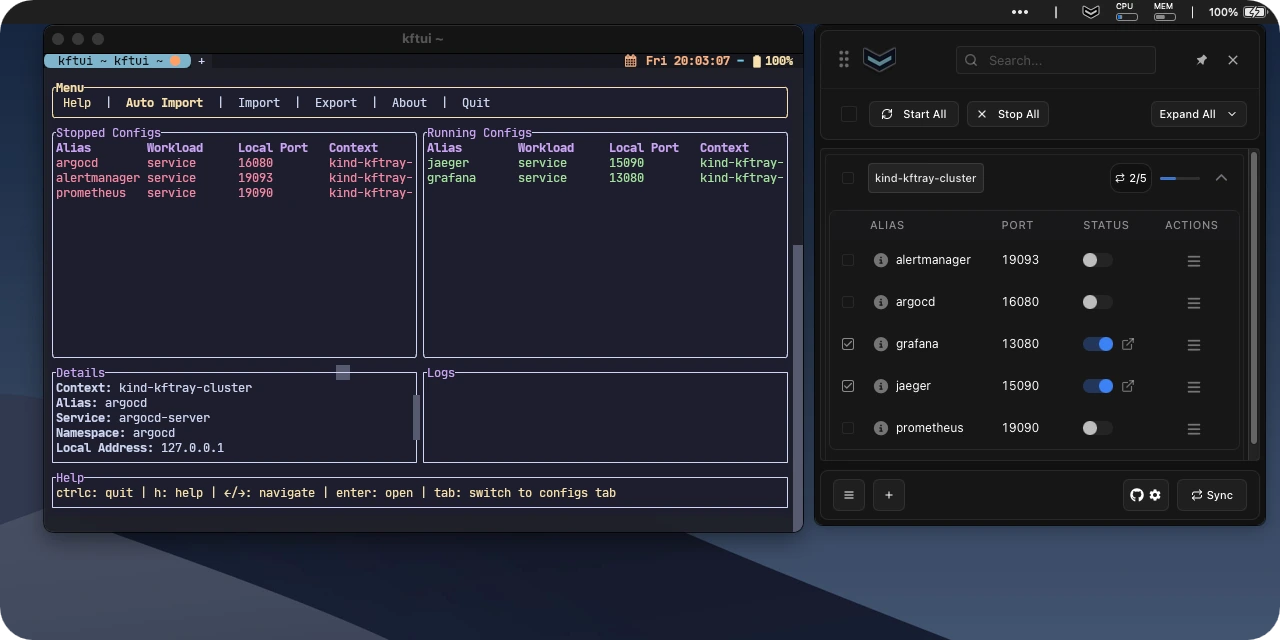kftray

manage and run multiple kubectl port-forward configurations directly in the menu bar, syncing configurations with git repositories.
Productivity

Why
Both apps were made to fix common problems with Kubernetes port forwarding. The usual kubectl port-forward command can be unreliable. For example, if a pod dies, it needs manual reconnection. It also has trouble setting up many port forwards at once and doesn't support UDP services.
They automatically reconnect to running pods if one fails, also it allow setting up multiple port forwards with one click, and support both TCP and UDP protocols. kftray also has extra features like HTTP logs tracing and GitHub sync to make workflows smoother.
Features
- Resilient Port Forwarding Connection: Ensures continuous service even if a pod dies by reconnecting to another running pod automatically.
- One-Click Multiple Port Forwards: Allows for the setup of several port forwarding instances simultaneously with a single click.
- Independent of Kubectl: Directly interfaces with the Kubernetes API, eliminating the need for
kubectl. - Multi-Protocol Support: Enables access to internal or external servers through a Proxy Relay server deployed in a Kubernetes cluster, including TCP and UDP port forwarding.
- HTTP Logs Tracing: Enable or disable HTTP logs for specific configurations to save the requests and responses in a local log file. (Currently available only in the kftray desktop app) - Blog Post
- GitHub Sync: Keep your configurations saved on GitHub and share or synchronize them in a GitOps style. (Currently available only in the kftray desktop app)
- Auto Import: Automatically import Kubernetes service configurations based on specific annotations. An example with an explanation can be found in this repo: https://github.com/hcavarsan/kftray-k8s-tf-example
| Feature | kftray (Desktop App) | kftui (Terminal UI) |
|---|---|---|
| Resilient Port Forwarding Connection | ✔️ | ✔️ |
| One-Click Multiple Port Forwards | ✔️ | ✔️ |
| Independent of Kubectl | ✔️ | ✔️ |
| Multi-Protocol Support (TCP/UDP) | ✔️ | ✔️ |
| HTTP Logs Tracing | ✔️ | ❌ (Coming Soon) |
| GitHub Sync | ✔️ | ❌ (Coming Soon) |
| Local JSON File Configuration | ✔️ | ✔️ |
| Auto Import with k8s Annotations | ✔️ | ✔️ |
kftray - Desktop App
kftui - Terminal User Interface
kftray server - Proxy Relay Server
Contributing
- Pull Requests: Feel free to create pull requests for bug fixes, new features, or improvements.
- Issues: Report bugs, suggest new features, or ask questions.
- Feedback: Your feedback helps improve kftray.
License
kftray is available under the MIT License. See the LICENSE file for full details.
Star History
Contributors ✨
Thanks goes to these wonderful people (emoji key):
Henrique Cavarsan 💻 | Filipe Andujar 💻 | Ikko Eltociear Ashimine 💻 |
This project follows the all-contributors specification. Contributions of any kind welcome!






